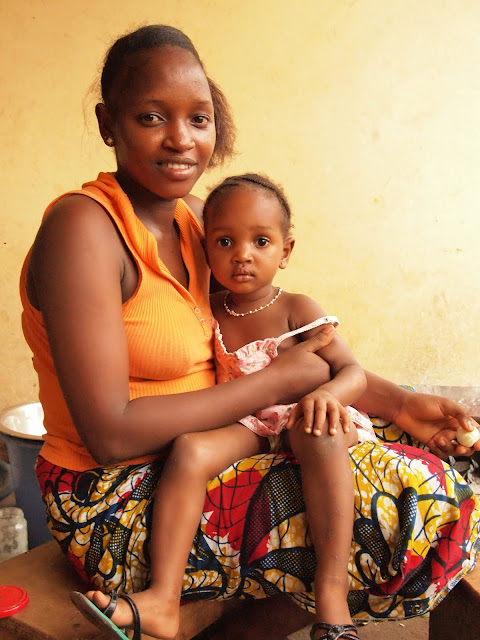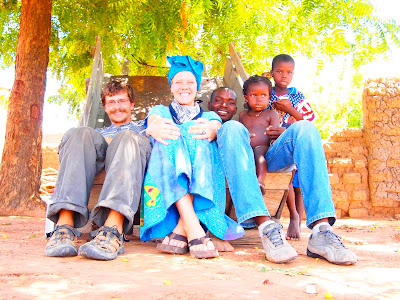“Two tickets to San,” I say to the woman seated behind the barred bus station window. “Names?” she asks. “Jennifer Davis and Abdoulaye Bangoura,” I reply and hand over the money, 12,000 CFA (~$26), as she hands over the tickets.
 |
| I like the spelling of our names: Jenniphere...and...Bamcoura |
And then
Abdoulaye and I are San bound! It's our first adventure together outside of the
Koulikoro region and we are headed to the village where I spent my first two years in Mali, from 2008-2010, as a Peace Corps Volunteer to visit Annie, Christine and the whole Coulibaly family +
Jim. When Annie left in
June we promised to come and visit and we wanted to make good on our promise before the school year (and therefore, work) picks back up again. With the weather cool and cloudy it is also the perfect time to travel and we wanted to make the trip before Ramadan began on August 1
st because of the following equation:
Ramadan + Traveling on Malian Public Transport = Grumpy Passengers
Best to avoid above equation if at all possible. Because sometimes it doesn't even take Ramadan:
Traveling on Malian Public Transport = Grumpy Passengers
Better to not intensify it.
We pack a suitcase the night before and tuck in gifts for the family between changes of clothes and toothbrushes. Abdoulaye remembers Annie loves potatoes and so he buys 5 kilos to share with the family. I get tea and sugar for Esayi – sometimes guys can be the easiest and also the most difficult to shop for :)
Esayi meets us at the volunteer house in
San on Friday afternoon and we load our belongings and selves into his horse cart. Riding out of the city I point out familiar places to Abdoulaye from the two years I spent coming and going to San each week to get groceries, use the internet and have a cold drink in this regional capital. I point out Abu's tailor shop, the direction of market and Bacho's boutique, and the BNDA where I spent many a Monday morning waiting to withdraw part of my Peace Corps stipend to spend at San's weekly market. We marvel, along with Esayi, at how quickly San is building up. The road leading out of San and into the bush is littered with half-built homes and piles of rough, cement bricks demarcating lot lines. The suburbs exist even in Mali!
As we hit the limits of the city we pass a teenage girl. The trot of Esayi's horse hasn't quickened enough to keep us from greeting but before we can she calls out “Blanche Neige!” Snow White! We laugh at her substitute for the standard 'toubabu!' (foreigner/white person) and turn our attention to the packed dirt path ahead. I flop on my stomach to stay in the shade of my straw hat and listen to Abdoulaye and Esayi speak to one another in their respective forms of Bambara.
It's Abdoulaye's first time on a horse cart and we snap photos along the way as we pass fields and families farming beside tiny, tucked away hamlets. I admit to Abdoulaye I did not have much patience for long, painful horse cart rides during my first two years and opted instead to use my Peace Corps issued bike which I would sometimes ride alongside Esayi's cart. When we arrive in village, backsides sore from bouncing on the floor of the cart – a thin mat separating the two – Abdoulaye understands why.
 |
| roil and boil. |
Annie and Christine are freshly coiffed by Batuma, Annie and Esayi's oldest daughter, and are waiting for us along with Jim, Emma and Le Vieux beneath a millet stalk hanger. We unload our bags from the cart and sigh with relief to be on solid ground once again. Jim, who has now been at site close to a year (!), welcomes us to his home, where Tamara and I also spent our service as Environment Peace Corps Volunteers, and we unload our things before re-joining the family outside.
I plop onto a plastic string chair and pick up the comfortable thread of conversation always left with Jim. Abdoulaye
joins Annie as she pounds millet and Christine wanders over to check him out, too. Calm, familiar, routine. Words some people really don't like. Feelings I've grown to love.
Then night falls and after a bucket bath Annie serves dinner – beans and bread – on a small, cloth-covered table. “Brussey-kono restauranti,” Annie says cheekily. Bush restaurant. We giggle with her and tell her that it's just like Bamako; we feel right at home.
 |
| she's a little girl! |
We retire to bed early, exhausted from waking up at 5 a.m. for an eight hour bus ride followed by an hour-and-a-half horse-cart ride out to village. But it hasn't rained in over a week and the balmy weather makes it difficult to fall asleep. Sleeping inside a mud-hut is like taking a nap in a hot-yoga studio. It's happening alright but your clothes are soaked through at the end of it and you're just left wanting more sleep. We wake up groggy the next morning and eat breakfast, siri porridge, when we sense a change in the weather. We get up to look outside and see a slow, dark mass creeping towards us from the eastern sky. “Rain!” we shout. Esayi looks relieved though not yet convinced rain is actually on its way. Abdoulaye reminds me that every person we've greeted thus far has said they're doing fine and their families are fine but where is the rain?!?
A heavy rain begins to fall and we watch the storm from inside Annie's hut. Thick drops of rain swirl around the compound and bursts of water pour from clay drain pipes into the depressed grooves on Annie and Esayi's packed-earth lawn. The storm slows to a drizzle and we decide to take a nap to catch up on the sleep we missed the night before. When we wake up Abdoulaye and I embark on a village tour. The place has become a ghost town with the onset of the rains this morning – everyone is out in the fields taking advantage of the soft soil – and I am secretly relieved to avoid the prying questions of who Abdoulaye is and what he's doing here. We do meet a few grandparents along the way, those too old for intense farming, but they spend more time remarking my long absence from village and dismiss Abdoulaye's presence once they discover he speaks only a stilted Bambara since they speak no French.
I show Abdoulaye my favorite places around town – Fakoro's garden, baby pig outposts, a big tree on the outskirts of town, Dramane's garden – before we make the loop back home and Abdoulaye marvels at both the breadth and intimacy of the village. As we enter the compound Annie takes note of our scruffy hair and dirty feet and gestures to a boiling pot of water nearby. “Does Abdoulaye want to take a bath?” she asks and I take the hint. I scoop bowl after calabash bowl of cool water into a plastic bucket and add hot water to taste before placing it on the cement floor of the bathroom. By now the sun has set and the first stars of the evening are making their appearance.
Dinner is served again on a table and we fill our bellies with freshly steamed dumplings and a bowl of pasta sent over by our neighbor, Maté. Esayi makes tea and we sleepily chat with one another and absently watch television brought out especially for our visit. Annie knits as we chat about goings-on in Bamako and America and before long we are all yawning and checking the time on my watch. We say goodnight and, having wizened up to the temperature difference, collapse into our mosquito tent set up outside. I quickly fall into a deep sleep but Abdoulaye is too concerned the interior wall we're sleeping behind is going to be charged by a wild cow/donkey/goat and so he does not. At least one of us doesn't wake up groggy!
 |
| All gussied up and somewhere to go |
On Sunday morning Abdoulaye lays in Jim's hammock and practices reading aloud from the new English
book we just ordered online and received when Suzy came to visit. Jim doesn't speak French and Abdoulaye doesn't really speak Bambara so the two boys are communicating in a combination of broken Bambara and English (Abdoulaye) and English (Jim). They manage to get their points across.
Then the church bell rings and we head over to sing, clap and sit our way through a two-hour church service before noshing on zamé, me and Jim's favorite rice dish, and packing up to head home, our weekend in village already at a close! Christine insists on joining us for the horse-cart ride to the paved road about 17km away but when we head out around 2 p.m., Abdoulaye pulls her onto his lap and, a few minutes in, she promptly falls asleep. An hour later we have arrived at a bus stop and we wait until 5:30 p.m. when a bus finally passes by from San that has space for two. Annie, Esayi and Christine wave goodbye from their horse-cart and head back to village as we head back to Bamako, the sun slowly dipping in the horizon.
On the ride home I gently squeeze Abdoulaye's hand and sneak peeks at him between cat naps. I have now shared my village experience with heavy handfuls of people who are incredibly dear to me in person and through my blog. I'm so happy to add Abdoulaye to the list.
See more pictures from our trip
here!





































